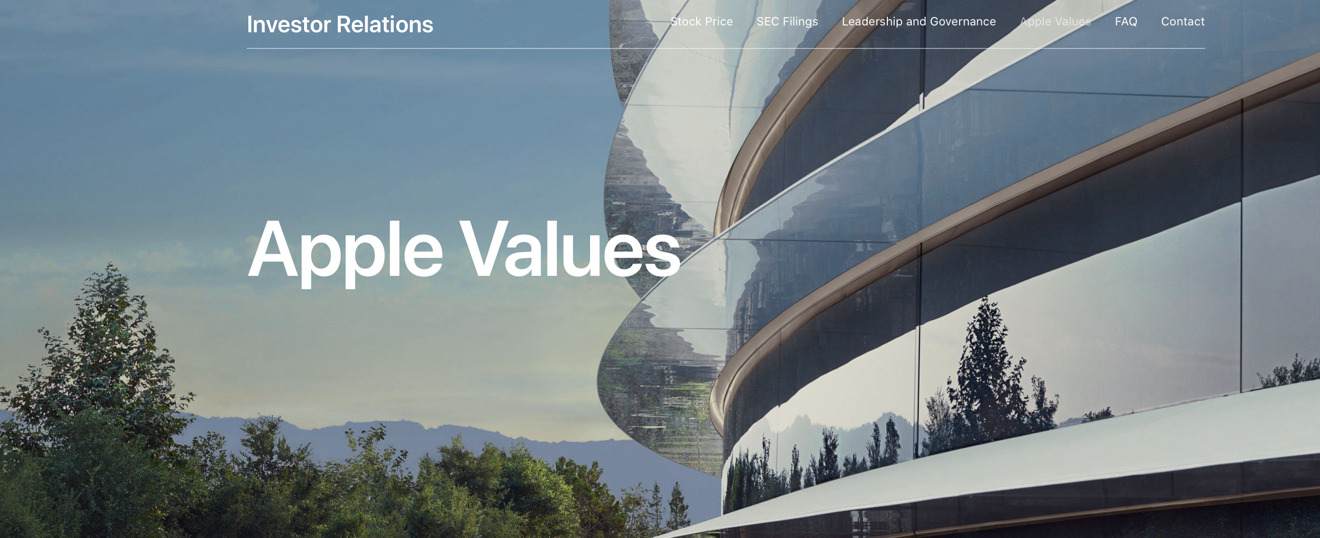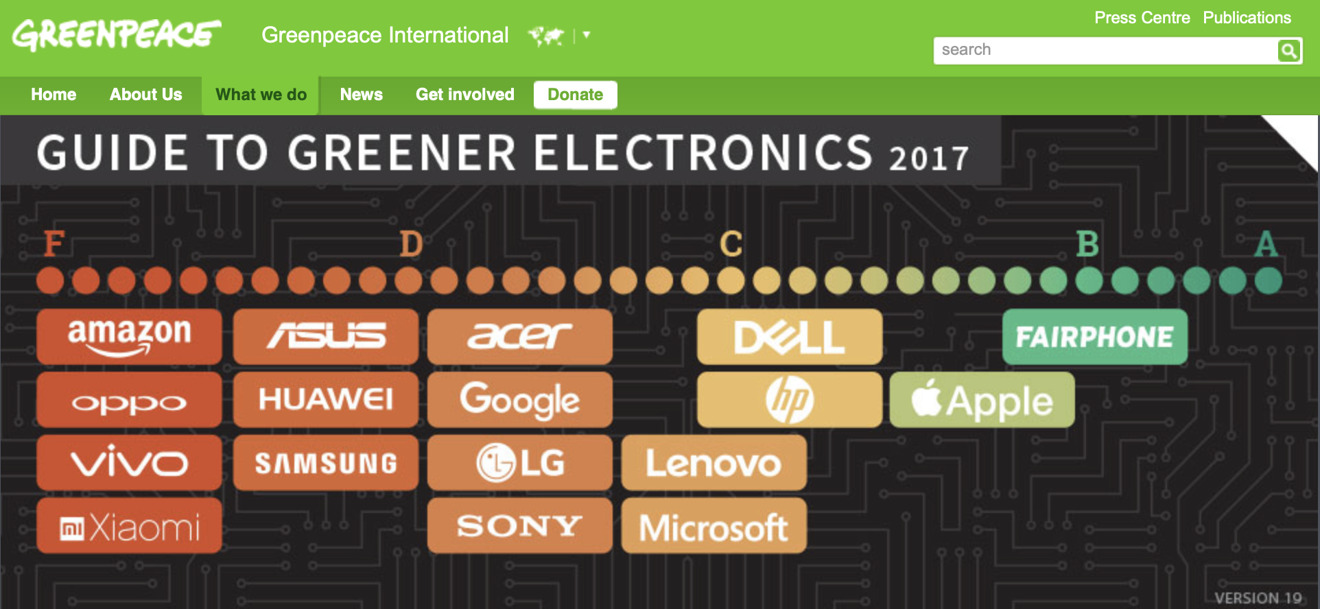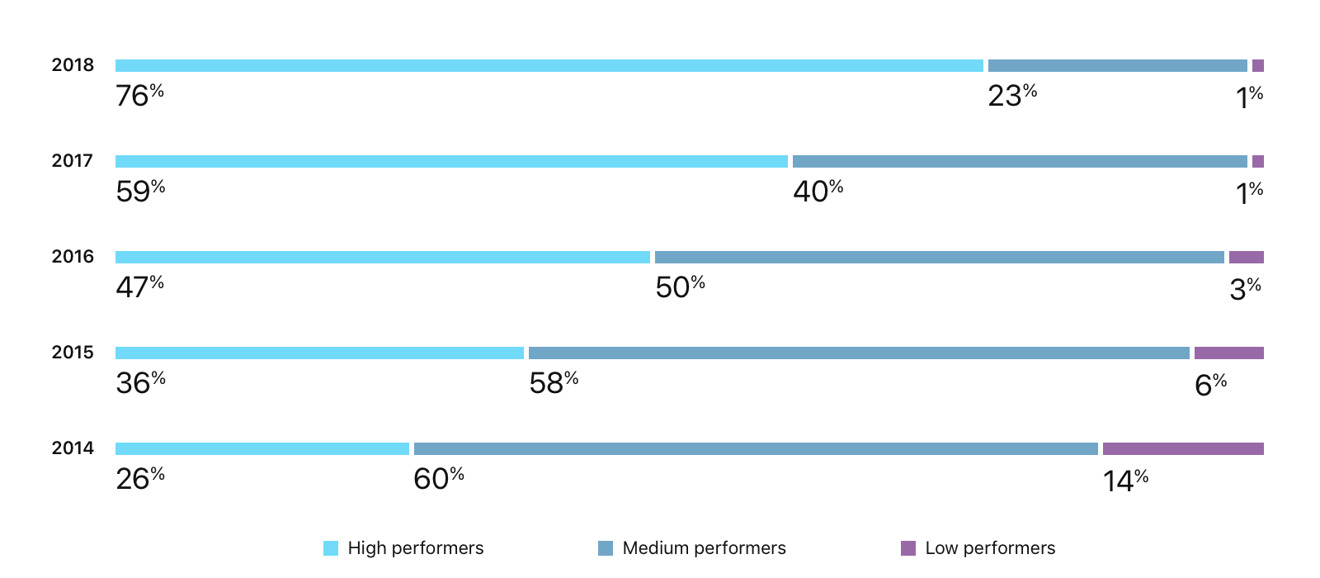Apple pioneered the concept of making its products accessible to users with disabilities back in the 1980s. It has made environmentally sound manufacturing and supplier responsibility a key aspect of its global operations. It has taken a public stand for inclusion and diversity and has made privacy and security primary features of its products. Why haven't other tech giants offered more than a meek "me too" in these areas?
Apple advertises its values to investors
While Apple has featured privacy, environmental work, and product accessibility in its product advertising, the company's strongest statements of its corporate values are presented to the company's investors. Unlike Microsoft, Samsung, Huawei, or Google, Apple's Investor Relations website prominently features a series of reports detailing its corporate values, including the company's initiatives related to accessibility, education, the environment, inclusion and diversity, privacy and supplier responsibility.
In 2007 Apple began publicly reporting corporate responsibility metrics, including its work on environmental issues and working conditions. This appeared to be a reaction to a series of cynical, dramatized, and often even false media reports that began targeting Apple's manufacturing practices in the iPod Era.
The "Guide to Greener Electronics" by Greenpeace is still flawed in many respects, but it cites Apple as the only major electronics brand with an above-average B+ grade, while handing Microsoft Cs and Ds and giving Google and most its Android licensees D grades. Amazon and Chinese Android makers Oppo, Vivo, and Xaiomi all got solid F grades, largely for their failure in environmental responsibility and sustainability.
Apple has consistently expanded its reporting and tightened its standards, gaining attention from both responsible investors and consumers. That subsequently prompted Samsung to begin generating similar reports, even though that company was involved in mass manufacturing for far longer than Apple had been — yet somehow had never stumbled onto the concept on its own.
A variety of global manufacturers now call attention to their efforts to operate responsibly and set standards for their supply chain, although none appear to report as much detail as Apple does.
Despite that reality, media personalities have targeted Apple with stories that twist its own reports into allegations of wrongdoing, while giving a pass to Google, Microsoft and their broad partnerships with cut-rate licensees and manufacturers who often lack any commitments to their international workers, to responsible sourcing, and to the environmental impact of their manufacturing. Samsung and Huawei have made greater efforts to copy Apple's icons, apps, and bezels than they have Apple's values as a company.
For Android, not only are hundreds of millions of mobile devices built on the cheap to reach a global Average Selling Price of around $250 each year, but those devices are subsequently thrown out after only a short life span. Most are never even updated after the first year, resulting in a massive global pipeline of low-quality e-waste that simply isn't a topic of conversation. Apple not only builds devices that last for years, but has instituted and publicized recycling efforts and trade-in systems to recover as much material as possible for use in future products.
Google has effectively done nothing to close the Android waste loop. Its manufacturing partners are unable to sell significant volumes of premium devices that last or are worth much to recycle. Yet the only reporting on environmental activity in mobile devices has largely sought to vilify Apple, by combing through its transparency reports looking for facts to stretch into irresponsible clickbait headlines.
Further, Apple has been assailed for decades over policies including its non-replaceable batteries. Yet from the first iPods to modern devices, Apple has effectively erased the use of millions of replaceable or disposable batteries that would commonly end up as toxic garbage, while at the same time advancing the state of the art in battery chemistry to achieve all-day use without the need to carry a series of battery packs. Samsung and other makers initially promoted disposable batteries but were eventually forced to follow Apple's lead— only because it became cost-efficient, not because of any real values held by its executives.
In some areas, environmental concerns are simply efficient business decisions. The massive cloud services operated by Amazon, Google, Microsoft, and Apple require vast amounts of energy to operate and cool, so it simply makes sense to position these next to cheap sources solar, geothermal, or hydroelectric power. Many of these companies tout their "environmental" credibility in these areas, but Apple is unique in driving all of its corporate and even retail operations from renewable energy, when doing so isn't just the cheapest way to do business.
Privacy as a value
This week, Google and Amazon introduced the idea of letting their users opt-out of human reviews of their voice assistant recordings, but only after Apple announced the policy on its own. Google, Facebook, and a variety of messaging companies have similarly also only recently promoted the idea of supporting end-to-end encryption, something Apple established early on. Apple introduced hardware-based device encryption on its second-generation iPhone. Android device and services still struggle with encryption, partly due to the added component expense and partly because those surveillance advertising companies don't share any interest in privacy.
As commercial entities, their business models are opposed to real user privacy. They exist to violate your privacy and exploit it for their benefit.
Apple defended its iPhone users' rights to privacy through encryption and secured hardware right up to fighting the U.S. government and the FBI over the issue. That occurred even in the face of a dramatized— but entirely false and disingenuous— portrayal by the federal government that sought to portray Apple as refusing to stop terrorism. Despite the lies, Apple didn't back down, even as other companies' leaders cowardly supported the idea of giving up control of their private data in the face of false government demands.
Microsoft gave the U.S. government backdoor keys that its agencies immediately mishandled. Google never bothered to pretend to secure its Android customers at all. Amazon and Facebook have worked to build products that effectively are surveillance tools, and casually shovel private data at essentially any government entity that asks for it.
While flaws and vulnerabilities are discovered everywhere, Apple has increasingly worked to not only fix issues but also create an ecosystem that is rapidly patchable at massive scale. When flaws were discovered in the new Apple Watch Walkie-Talkie implementation, Apple pulled the feature to protect its users and then rolled out a patch that restored the feature. Microsoft and Google often can't do this on their platforms, and have little to no control over the various flaws implemented by their licenses.
Diversity, Inclusion and Workers' Rights
In its direct hiring, Apple notes that "we know that an inclusive and diverse workforce drives innovation and makes Apple stronger. That's why we're committed to hiring more diverse talent for jobs at all levels, attracting candidates from more diverse pipelines, leveraging technology to prevent bias, and driving development efforts to increase representation in leadership across the company."
And globally, across its vast supply chain, the company stated in its most recent Supplier Responsibility report that, "we care deeply about the people who build our products, and the planet we all share. So we hold ourselves and our suppliers to the highest standards to ensure everyone is treated with dignity and respect. And we share our work openly so others can follow our lead."
Other tech companies have followed Apple's lead in working to present more data on how they hire their own workers. But few have attempted to make a similar impact on the supply chains that feed their production. In the case of Microsoft and Google, the companies build very little of the devices that make up their platforms and have very little impact on the companies that produce most of the products that run their software.
Apple's leadership in supply chain responsibility and its Supplier Code of Conduct requires not only its direct contractors to provide fair working hours, a safe workplace, and an environment free from discrimination, but also extends its influence up the supply chain, making the broadest possible impact on how people are treated. Since it began working to enforce worker's rights in 2007, Apple notes that 17.3 million people "have been trained on their rights," a requirement it makes for employers hiring on their first day.
"For more than a decade, Apple has been one of the few companies to closely drive and report on working-hours compliance," the company noted, adding, "we have zero tolerance for debt-bonded labor. We prohibit forced labor of any kind, and suppliers must take immediate action or risk removal from our supply chain."
Debt-bonded labor is rampant in Asia. It is effectively slavery. Recruiters routinely employ workers and then charge them fees that they must repay as a condition of their employment, forcing people with few options into arrangements where they work for months just to pay off their opportunity to hold a job.
In 2008 Apple limited these fees to one month's wages, better than the limit set by local governments. In 2015, Apple eliminated this practice among its suppliers, and contractually obligated its partners to repay the total of any recruitment fees it discovers.
"We also conduct investigatory interviews with employees to ensure that they're working of their own free will. If suppliers who are found in violation do not implement corrective measures, they risk removal from our supply chain," the company reported. Last year, Apple was awarded the Stop Slavery Award by the Thomson Reuters Foundation for leading the industry in eradicating forced labor.
There is no indication that other low-profit Android and Windows PC makers set similar standards. Android phones are cheap because they are products of slavery. Yet the Verge, CNET and other Android mouthpieces are loathe to acknowledge this fact, preferring instead to twist Apple's own reports to suggest that the company is enabling the practices it is actively working to end. These are all examples of the values that Apple has the luxury of advocating and enforcing, but which Google and its partners and advocates either don't care about or refuse to even acknowledge.
Environmental impact
Apple has not only changed the world in terms of how workers are treated, but has also materially shifted the environmental impact of its entire supply chain. The company's "rigorous assessment process that measures how well our standards are being met" has evaluated the conditions at 770 manufacturing facilities, logistics and repair centers, retail stores, and contact centers as well as 279 smelter- and mine-level sites.
Since 2014, compliance and the quality of compliance with Apple's standards have improved drastically, but only because the company is leveraging its commercial impact to make these changes happen. Other consumer electronics makers are either not concerned with making a difference, or simply unable to affect any change on a global basis.
Another aspect of Apple's impact on the global environment is that it is uniquely capable of supporting devices for years with OS updates. Today's iOS 12 works on products first sold back in 2013, keeping them relevant and useful to the original owner or a secondhand buyer. This works in Apple's benefit because it increases the active installed base of iOS users. But it also reduces the amount to waste that is dumped in landfills, and creates an awareness of the value of recycling. Google has been unable to get its licensees to agree to support updates on their products for even a year and a half.
How does Apple find the time and inclination to maintain values as a company in a cutthroat business environment where its competitors share at most a surface pretense of creating the illusion of having any values that impact how their companies do business? In part, this comes from Apple's efforts to build products that are good enough to command a price premium, sustaining a level of profitability that enables the company to set high standards for itself, its partners and its supply chain. But it also comes from a corporate culture that attracts and retails workers and executives that have principled values.
Apple's corporate culture is vastly different from that of Google or Microsoft, and certainly has very little in common with Huawei and Samsung, which both built their empires on copying the products of others without much interest in also copying their values or guiding principles.
 Daniel Eran Dilger
Daniel Eran Dilger










-m.jpg)






 Andrew Orr
Andrew Orr
 Wesley Hilliard
Wesley Hilliard

 Oliver Haslam
Oliver Haslam
 Christine McKee
Christine McKee
 Amber Neely
Amber Neely










24 Comments
You lost me at inclusion and diversity. Damn.
Oh gee another DED Apple good competition bad article. One wonders if this is all just projection. I mean if you have to keep writing editorials saying how good Apple is...
How is Apple a monopoly on values? Are the keeping other companies from being sustainable, diverse or privacy focused?